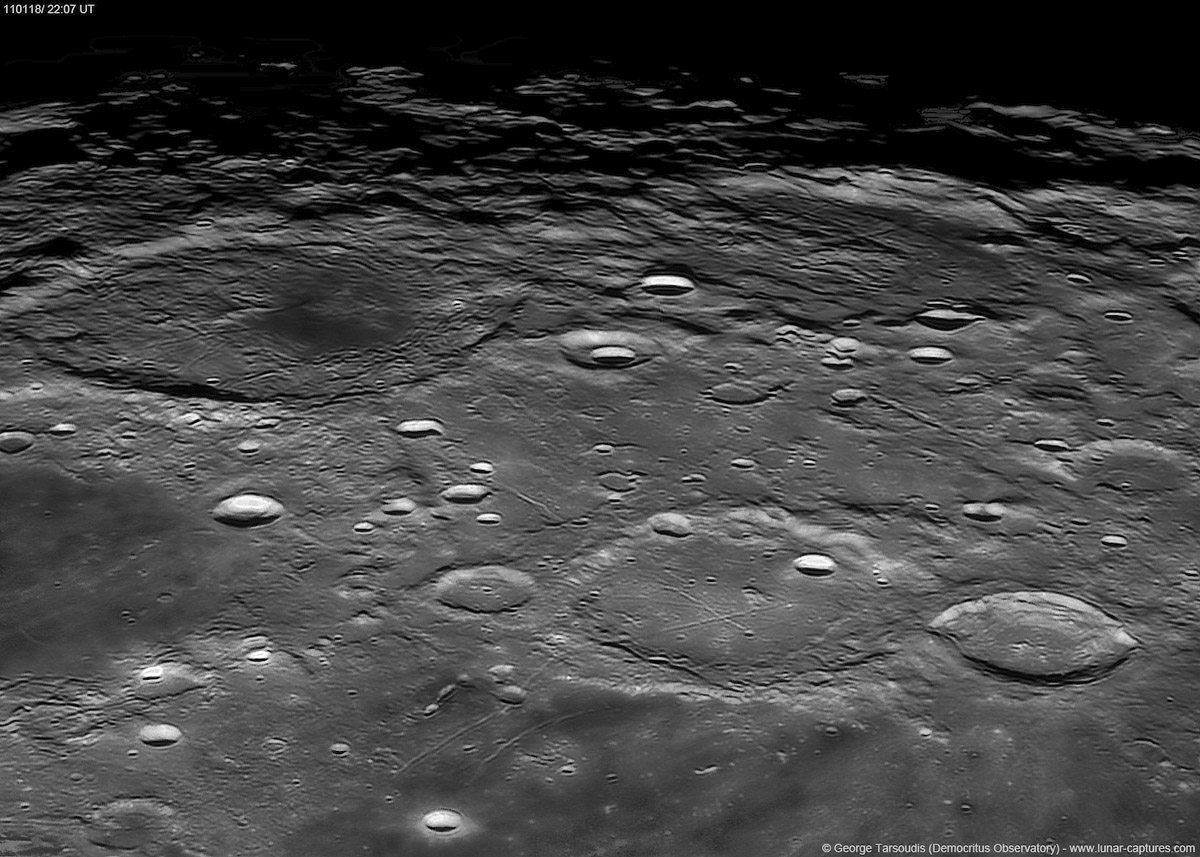Difference between revisions of "January 31, 2011"
| Line 6: | Line 6: | ||
<em>image by [mailto:gtarsoudis@gmail.com George Tarsoudis], Greece</em><br /> | <em>image by [mailto:gtarsoudis@gmail.com George Tarsoudis], Greece</em><br /> | ||
<br /> | <br /> | ||
| − | Linear rilles are commonly interpreted as troughs that collapse over dikes - vertical sheets of magma - that push apart the crust. | + | Linear rilles are commonly interpreted as troughs that collapse over dikes - vertical sheets of magma - that push apart the crust. |
| − | It is not always understood what causes the stresses that lead to formation of the dikes, but many are roughly perpendicular | + | It is not always understood what causes the stresses that lead to formation of the dikes, but many are roughly perpendicular |
| − | to the western shore of Oceanus Procellarum. Examples include the rilles in and near Hevelius and Riccioli, imaged by George. | + | to the western shore of Oceanus Procellarum. Examples include the rilles in and near Hevelius and Riccioli, imaged by George. |
| − | The rilles crossing the floor of Hevelius form an X with a bisecting rille passing near the middle. If each one of these rilles marks | + | The rilles crossing the floor of Hevelius form an X with a bisecting rille passing near the middle. If each one of these rilles marks |
| − | a minimum stress direction this seems to indicate that there were different stress field over time. We don't know why that should | + | a minimum stress direction this seems to indicate that there were different stress field over time. We don't know why that should |
| − | be but probably could make up stories to explain it. A rille outside Hevelius trends in the same direction as one on the floor, and | + | be but probably could make up stories to explain it. A rille outside Hevelius trends in the same direction as one on the floor, and |
| − | heads toward Riccioli, where some short segments seem to go the same way. Ejecta from the Orientale Basin and dark lavas | + | heads toward Riccioli, where some short segments seem to go the same way. Ejecta from the Orientale Basin and dark lavas |
| − | obscure a patchwork of rilles on Riccioli's floor. Some of these rillelettes have the same orientations as ones in Hevelius | + | obscure a patchwork of rilles on Riccioli's floor. Some of these rillelettes have the same orientations as ones in Hevelius suggesting that the stress fields are somewhat regional and not just due to characteristics of the craters. On a different topic, did you notice |
| − | + | [http://lpod.wikispaces.com/December+8%2C+2008 Miyamori's Non-Valley]? | |
| − | [http://lpod.wikispaces.com/December+8%2C+2008 Miyamori's Non-Valley]? | ||
<br /> | <br /> | ||
<em>[mailto:tychocrater@yahoo.com Chuck Wood]</em><br /> | <em>[mailto:tychocrater@yahoo.com Chuck Wood]</em><br /> | ||
| Line 25: | Line 24: | ||
Rükl plates [http://the-moon.wikispaces.com/R%C3%BCkl+39 39] & [http://the-moon.wikispaces.com/R%C3%BCkl+28 28]<br /> | Rükl plates [http://the-moon.wikispaces.com/R%C3%BCkl+39 39] & [http://the-moon.wikispaces.com/R%C3%BCkl+28 28]<br /> | ||
<br /> | <br /> | ||
| + | <hr /> | ||
<p><b>Yesterday's LPOD:</b> [[January 30, 2011|Why Volcanoes Are Where They Are]] </p> | <p><b>Yesterday's LPOD:</b> [[January 30, 2011|Why Volcanoes Are Where They Are]] </p> | ||
<p><b>Tomorrow's LPOD:</b> [[February 1, 2011|Green, but not Cheese]] </p> | <p><b>Tomorrow's LPOD:</b> [[February 1, 2011|Green, but not Cheese]] </p> | ||
| − | < | + | <!-- End of content --> |
{{wiki/ArticleFooter}} | {{wiki/ArticleFooter}} | ||
Revision as of 14:25, 1 March 2015
Trough Musings

image by George Tarsoudis, Greece
Linear rilles are commonly interpreted as troughs that collapse over dikes - vertical sheets of magma - that push apart the crust.
It is not always understood what causes the stresses that lead to formation of the dikes, but many are roughly perpendicular
to the western shore of Oceanus Procellarum. Examples include the rilles in and near Hevelius and Riccioli, imaged by George.
The rilles crossing the floor of Hevelius form an X with a bisecting rille passing near the middle. If each one of these rilles marks
a minimum stress direction this seems to indicate that there were different stress field over time. We don't know why that should
be but probably could make up stories to explain it. A rille outside Hevelius trends in the same direction as one on the floor, and
heads toward Riccioli, where some short segments seem to go the same way. Ejecta from the Orientale Basin and dark lavas
obscure a patchwork of rilles on Riccioli's floor. Some of these rillelettes have the same orientations as ones in Hevelius suggesting that the stress fields are somewhat regional and not just due to characteristics of the craters. On a different topic, did you notice
Miyamori's Non-Valley?
Chuck Wood
Technical Details
18 January 2011. 10 inch Orion Optics Newtonian Telescope @ f/6.3, camera Unibrain Fire-i 785, barlow 3X, filter red, all videos processing with AVIStack at Win 7 (64 bit).
Related Links
Rükl plates 39 & 28
Yesterday's LPOD: Why Volcanoes Are Where They Are
Tomorrow's LPOD: Green, but not Cheese
COMMENTS?
Register, Log in, and join in the comments.



